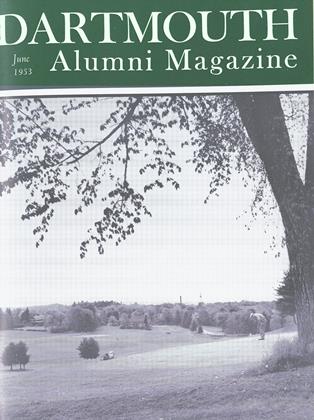CONSERVATION
Robert S. Monahan '29, who has prepared this month's "Bookshelf," is Dartmouth College Forester. He was with the U. S. Forest Service for 14 years before joining the College staff in 1947.
Whether by accident or design, it is a fact that the wave of rather pessimistic books published toward the end of the last decade on the plight of our renewable natural resources was met at the start of this decade with a strong rising tide of more optimistic opinions. Our PlunderedPlanet (1948) by Fairfield Osborn and Road to Survival (1948) by William Vogt are two significant survivors of that alarmist period. The first two books listed below follow a different pattern strong convictions based on lifetime careers of pioneer conservationists that the drain on our natural resources, although still serious, is being offset by more intelligent management. The Government publications which follow provide authoritative reading but are more impersonal and therefore less readable. The suggested readings will pay dividends during the Mid-Century Conference on Resources for the Future, to be held in Washington, D. C., next December 2 to 4.
BREAKING NEW GROUND. Gifford Pinchot. (Harcourt, Brace, 1947.) The first Chief Forester describes how he not only introduced the word "conservation" into our everyday language but also gave it real meaning and continuing significance in our national economy. He was to Theodore Roosevelt the same personal adviser on problems of natural resources that Sherman Adams '20 may well become in the present administration. Always a colorful exponent of the public's interest first, Pinchot's biography describes eloquently the political and economic results of the Roosevelt-Pinchot team of 50 years ago.
FORESTS AND MEN. William B. Greeley. (Doubleday, 1951.) From his boyhood home amid the pasture pine of Gilmanton, N. H., to his adopted land among the Douglas fir bordering Puget Sound, the writer has observed at close range the effects of forest liquidation upon our natural resources. The dean of living American foresters, whose professional career since 1904 included ten years as Chief Forester of the United States and thirteen years as Secretary-Manager of the West Coast Lumberman's Association, he understands both the government and industrial sides of the picture.
WATER, LAND AND PEOPLE. Bernard Frank and Anthony Netboy. (Knopf, 1950.) The authors contend that centralized regulatory control, possibly under a recreated National Resources Planning
Board, is essential to properly coordinated use of our land and water. This approach is radically different from the Greeley opinions cited above.
AMERICAN FOREST POLICY: ASTUDY OF GOVERNMENT AND ECONOMIC CONTROL. Luther Halsey Gulick. (Duell, Sloan & Pearce, 1951.) The president of the Institute of Public Administration adopts forestry as his medium for illustrating what he considers sound public administration, justifying the role he feels each governmental unit should play in improving the present system. He believes state, but not federal, control of cutting on private land should be extended gradually, and tackles other vexing problems concerned with the division of responsibility between government and industry.
A WATER POLICY FOR THE AMERICAN PEOPLE The Report of the President's Water Resources Policy Commission in Three Volumes. (Government Printing Office, Washington, 1950.) This monumental treatment of our ten great rivers is solid reading but essential to a working knowledge of the problems and opportunities they pose. It is an up-to-date reference for facts, policies and philosophies dealing with our water resources.
RESOURCES FOR FREEDOM- Report of the President's Materials Policy Commission. (Government Printing Office, Washington, 1952.) This so-called "Paley Report" is another encyclopedic effort presented in five formidable volumes. An 82-page summary and detailed indexing are life-savers for time-harrassed readers. This is the most complete inventory of our postwar resources, both renewable and non-renewable, that will be compiled for some time.
COURSE OF EMPIRE. Bernard A. DeVoto. (Houghton Mifflin, 1952.) The uneasy occupant of Harper's "Easy Chair" builds a comprehensive historical background for current discussions of public land questions. The distinguished author is a recognized spokesman for those who feel such lands should be more fully protected from unreasonable abuse and sheer exploitation for private gain by a few.
WATER: THE MIRACLE OF NATURE. Thompson King. (Macmillan, 1953.) This latest book on a subject of growing importance deals first with water in the abstract and then sets forth the many ways in which water is used in the life of man. Most readers will prefer to skip the first part and direct their attention to the chapters dealing with navigation, irrigation, flood control, water power, and municipal supplies. "To conserve water is to conserve life."
 View Full Issue
View Full Issue
More From This Issue
-
 Class Notes
Class Notes1918
June 1953 By ERNEST H. EARLEY, RICHARD A. HOLTON -
 Article
ArticleTHE YEAR IN REVIEW
June 1953 By RICHARD C. CAHN '53, UNDERGRADUATE EDITOR -
 Class Notes
Class Notes1915
June 1953 By PHILIP K. MURDOCH., MARVIN L. FREDERICK -
 Article
ArticlePulling Answers Out of the Air
June 1953 -
 Class Notes
Class Notes1929
June 1953 By F. WILLIAM ANDRES, GEORGE B. REDDING -
 Class Notes
Class Notes1932
June 1953 By JOHN A. WRIGHT, JAMES D. CORBETT
Article
-
 Article
ArticleTHE WINTER CARNIVAL
March, 1914 -
 Article
ArticleDARTMOUTH AUTHORS
June 1989 -
 Article
ArticlePublic Viewing
MAY | JUNE 2014 -
 Article
ArticleClinton's News Guy
September 1993 By heather Killebrew '89 -
 Article
ArticleThe Dartmouth Indians
JUNE 1930 By Leon B. Richardson -
 Article
ArticleCreative Housing Option
NOVEMBER 1999 By Meeta Agrawal '01

